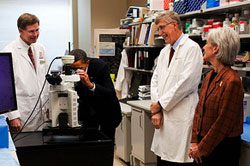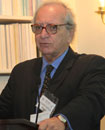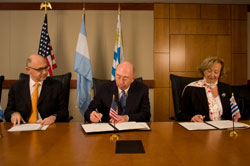Global health briefs
September - October, 2009 | Volume 8, Issue 5
President Obama visits NIH
President Obama visited NIH to announce that $5 billion in economic recovery funds had been granted before the end of the fiscal year. Here he looks through a microscope during a tour of an oncology laboratory at the National Cancer Institute. With him are Dr. Marston Linehan, left, NIH Director Dr. Francis Collins and Health and Human Services Secretary Kathleen Sebelius.
|

|
|

Dr. Eduardo E. Castilla
|
South American researcher gives Chiles Lecture
Dr. Eduardo E. Castilla, a prominent South American researcher into birth defects, gave the annual Lawton Chiles International Lecture on Maternal and Child Health in the Americas. The Latin American Collaborative Study of Congenital Malformation that Dr. Castilla heads, has built a network of 84 hospitals in 60 cities across nine countries that reports 200,000 births a year to help with the Study’s goal of “prevention through research.” |
US-Latin America commit to fighting cancer
Argentine Ambassador Héctor Timerman (left), National Cancer Institute Director Dr. John E. Niederhuber and Urugayan Minister of Public Health Dr. Mária Julia Muñoz, sign letters of intent to collaborate in cancer research. Along with Chile, which signed such a letter with the U.S. in June, these countries comprise the United States-Latin America Cancer Research Network, which is committed to developing a comprehensive understanding of the cancer burden among Hispanic populations in Latin America and the United States and to enhance the cancer research and care infrastructures in both regions of the hemisphere. |

|
About 10 percent of births are premature
About one in 10 births worldwide are premature, resulting in 1 million neonatal deaths a year, according to World Health Organization data analyzed by the March of Dimes. The estimate of 12.9 million premature births annually is conservative, analysts believe because few countries keep good statistics.
|
Drop in abortion linked to contraception
A report by the Guttmacher Institute links the increased use of contraception worldwide to the reduction of unintended pregnancies, which declined from 69 per 1,000 women age 15 to 44 in 1995 to 55 per 1,000 in 2008. At the same time, abortions declined from an estimated 45.5 million in 1995 to 41.6 million in 2003. The report said abortion occurs at roughly equal rates in countries where it is broadly legal and where it is not. The difference is that illegal, clandestine abortions cause significant harm to women, more so in developing countries.
|
Alzheimer’s cases increasing rapidly
The number of cases is growing so rapidly, the World Health Organization ought to make Alzheimer’s disease a global health priority, says the nonprofit Alzheimer's Disease International organization. It estimates 35 million people around the world have Alzheimer's and other forms of dementia, a 10 percent increase over 2005.
|
Paper explores disparity in disease funding
A recent article in the Bulletin of the World Health Organization argues that certain diseases are favored by funders because advocates have made them seem more important than others, regardless of the disease burden. Author Dr. Jeremy Shiffman of Syracuse University says advocates are effective when they emphasize the threat to human well-being, national security and economic development.
|
Lancet issue devoted to South Africa
A collaboration among The Lancet and academic institutions in the country has produced a special edition of the journal devoted to chronic diseases and health delivery in South Africa. The series of papers culminates in a call for action for the South African government, universities, training institutions, health councils, researchers and civil society to strength the country’s health care system.
|
To view Adobe PDF files,
download current, free accessible plug-ins from Adobe's website.